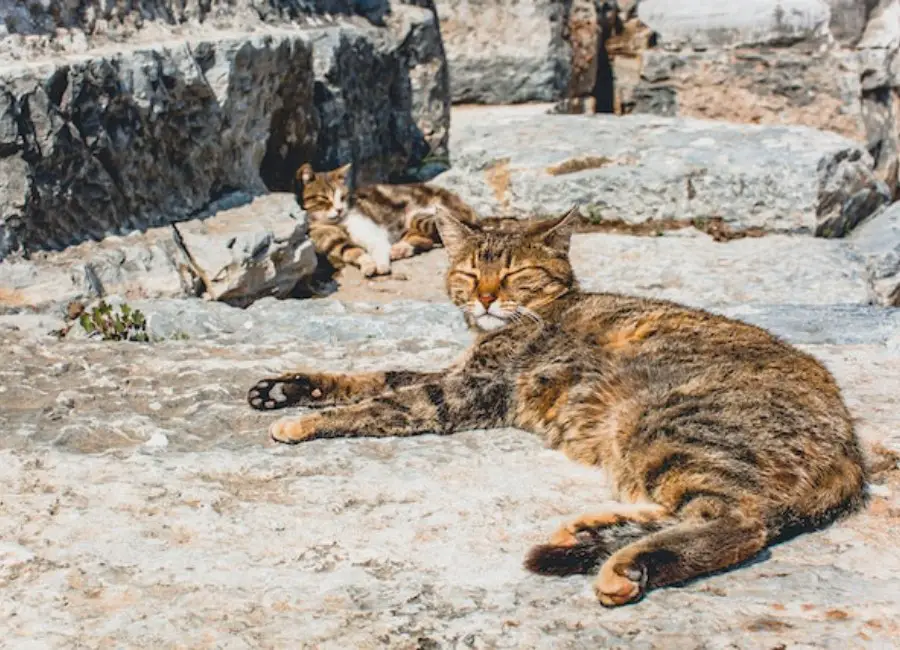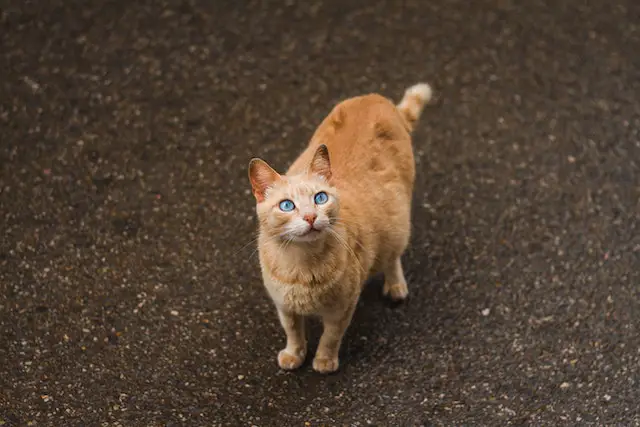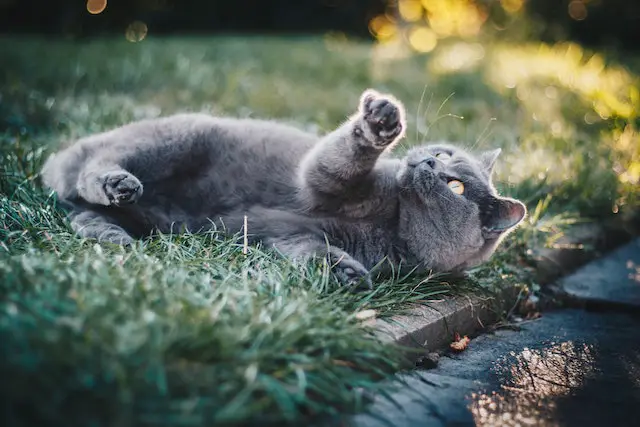11 Common Pregnant Stray Cat Behaviors

Let’s discuss pregnant stray cat behaviors…
Have you ever stumbled upon a pregnant stray cat and wondered how to care for her during this special time? Well, you’re in the right place!
In this post, we’ll be discussing pregnant stray cat behavior and tips on how to provide the best care for this feline mom-to-be.
Whether you’re a seasoned cat owner or a new animal enthusiast, you’ll definitely find some valuable insights in this article.
So, let’s dive right in!
Pregnant Stray Cat Behavior
The following are some common pregnant stray cat behaviors you should know:
1. Seeking Solitude
Pregnant stray cats may seek isolation and isolate themselves from their typical settings as the due date approaches.
They may seek a discreet and secure location to give birth and care for their newborns.
A calm and secure environment, such as a warm box with plush bedding, can provide them with the privacy they crave.
These them to connect with their kittens without upsetting their chosen birthing spot.
2. Nesting behavior
Pregnant stray cats, like their domesticated counterparts, frequently exhibit a strong nesting drive.
This behavior usually appears in the latter stages of pregnancy, when they begin to prepare for the arrival of their kittens.
You might come across them looking for a warm and isolated location to establish a safe sanctuary for their upcoming litter.
Keep a look out for strange nesting locations in your yard, such as cardboard boxes, closets, or hidden corners.
Nesting instincts can be satisfied by providing them with a pleasant and secure nesting environment, such as a snug box packed with soft blankets.
3. Increased Affection
Pregnancy might cause hormonal changes that boost a stray cat’s craving for love.
You may see your once-independent stray cat wanting more attention and physical interaction as their bodies prepare for motherhood.
When you visit any pregnant stray cat, they may rub up against your legs, purr more regularly, or even curl up next to you for long periods of time.
Gentle kindness and reassurance might help the pregnant stray cat feel safe at this vulnerable time.
You can use this time to connect with them through gentle strokes and calming words.
4. Protective Behavior
Pregnant stray cats become naturally protective of their expanding kittens as parenthood approaches.
They may act aggressively or defensively toward humans or other animals they perceive as dangerous.
This is their instinctive manner of guaranteeing the safety of their unborn kittens.
It is critical to respect their boundaries and avoid any abrupt moves or activities that may cause anxiety.
Allow them the space and time they need to acclimate to their protective instincts while remaining supportive.
5. Increased Sleep Time
Pregnant stray cats need extra rest to support their growing offspring.
Most stray cats may be napping more regularly or seeking out peaceful and comfy areas for extended periods of time.
Pregnancy’s physical demands can be exhausting, and sleep allows the cat’s body to replenish.
Making a nice and calm environment for them, such as offering soft things or a warm location in a quiet room, will help them relax and get the rest they require.
6. Restlessness
Pregnant stray cats who are restless are not unusual, especially in the later stages of pregnancy.
Due to discomfort or the expectation of giving birth, they may pace, circle, or show signs of agitation.
Physical changes and hormonal variations can cause the pregnant stray cat to feel agitated and uneasy.
Providing a safe and quiet environment can assist to ease their anxiety and foster a sense of serenity.
Set up a secluded space with a comfy bed and few distractions where they can go when they are restless.
7. Changes in Vocalization
Pregnant stray cats may become more noisy as their delivery date approaches.
They may meow or make other sounds to express their demands, displeasure, or anxiety.
Paying attention to their vocalizations and responding with patience and understanding can aid in the development of trust and reassurance.
Engage in soothing chats and gently reassure them that they are secure and supported.
8. Increased Sensitivity
Pregnancy hormone changes can make stray cats more sensitive to their surroundings.
Loud noises, rapid movements, or unusual odors can easily shock them.
Making a peaceful and quiet environment might make children feel more secure and at ease.
Keeping interruptions to a minimum and maintaining a tranquil environment will benefit their overall well-being during this critical time.
9. Seeking Human Assistance
Some pregnant stray cats, especially those that have had favorable interactions with humans, may actively seek human help during their pregnancy.
They may approach people in search of food, shelter, or even medical care.
Offering a helping hand can be a kind gesture that ensures their well-being and the well-being of their future kittens.
Providing healthy meals, a warm and secure environment, and access to veterinary care can have a substantial impact on their overall health as well as the successful birth and nursing of their kittens.
10. Increased Grooming
You may observe pregnant stray cats grooming themselves more frequently as the due date approaches.
This heightened grooming behavior serves several functions.
For starters, it keeps their fur clean and parasite-free, ensuring a healthy environment for their soon-to-arrive kittens.
Second, grooming improves blood circulation and serves as a relaxing self-soothing strategy during this period of physical and mental transition.
11. Decreased Activity
The activity levels of pregnant stray cats may decrease in the later stages of pregnancy.
They spend more time sleeping and preparing for the forthcoming labor as they conserve energy.
This decrease in activity is a natural adjustment that allows them to devote energy to the physical demands of delivery and subsequent kitten care.
During this time, it is critical to provide them with a peaceful and comfortable place to rest.
Learn more about the behavior of adopted stray cats.
Potential Ways of Identifying a Pregnant Stray Cat

Here are some possible ways to identify a pregnant stray cat:
- Changes in Behavior: Pregnant cats may show changes in behavior like becoming more affectionate or seeking out quiet and private spaces.
- Swollen belly: A pregnant cat’s belly will start to expand as the pregnancy progresses.
- Nipples: A pregnant cat’s nipples will enlarge and become more pink.
- Morning sickness: Some pregnant cats will experience morning sickness, which can include vomiting.
- Increased appetite: A pregnant cat will start to eat more food as the pregnancy progresses.
- Restlessness: A pregnant cat may become more restless as she prepares for the arrival of her kittens.
- Nesting behavior: A pregnant cat may start to look for a place to deliver her kittens and may try to create a nest.
- Licking: A pregnant cat may start to lick her lower abdomen as she prepares for delivery.
- Milk production: A pregnant cat may start to produce milk before she delivers her kittens.
- Fetal movement: As the pregnancy progresses, you may be able to feel the kittens moving inside the cat’s belly.
Learn more about the common behaviors of feral cats.
Possible Ways to Help a Pregnant Stray Cat

The following are some common ways to help a pregnant stray cat:
- Provide food and water – Pregnant cats require additional nutrition to support the growth and development of their kittens. Offering food and water can help them maintain their health during pregnancy.
- Provide shelter – Pregnant cats require a safe and secure shelter to give birth and care for their kittens. Providing a warm, dry and enclosed space, such as a cat box, can be helpful.
- Provide medical attention – Pregnant cats should receive medical attention to ensure their health. They also need proper vaccinations and deworming.
- Contact local animal control or rescue organizations – You can contact local animal control or rescue organizations to help rescue pregnant cats and provide them with medical care.
- Get the cat spayed after the kittens are weaned – Once the kittens are weaned, you can get the mother cat spayed to prevent future unwanted litters.
- Foster the pregnant cat and her kittens – If you have experience handling cats, and suitable resources, you can foster the pregnant cat and her kittens until they are ready to be adopted.
- Seek help from local animal lovers and shelters – There may be local animal lovers and shelters willing to help you provide for the pregnant cat and find homes for the kittens.
- Provide socialization – Socialization can help the cat and the kittens feel more comfortable around humans and increase their chances of being adopted.
- Educate others: Help spread awareness about the importance of spaying and neutering stray cats to reduce the population of homeless cats in your community. Encourage others to take action and support TNR programs.
Learn more about places where feral cats sleep.
Related Questions
How do I know if a stray cat is pregnant?
Pregnant stray cats may show signs of a swollen belly, enlarged nipples, and increased appetite. They may also exhibit nesting behavior and become more affectionate with humans. A veterinarian can perform a physical exam to confirm pregnancy.
How should I care for a pregnant stray cat?
Providing a safe and warm shelter, fresh water, and regular meals is essential for pregnant stray cats. It’s best to consult a veterinarian for proper nutrition and medical care. Make sure to handle the cat gently and minimize stress.
Can a pregnant stray cat be spayed?
Yes, a pregnant stray cat can be spayed, but it’s recommended to wait until after the kittens are born and weaned. This prevents any harm to the developing kittens and ensures the mother’s health.
How long is the gestation period for cats?
The gestation period for cats is around 63-65 days. During this time, the pregnant cat may become more reserved and seek out a quiet and comfortable spot for giving birth.
What should I do if I find orphaned kittens?
If you find orphaned kittens, it’s important to keep them warm and seek help from a veterinarian or animal rescue organization. They will have the expertise to provide proper care and find suitable homes for the kittens.
How can I help pregnant stray cats in my community?
You can support pregnant stray cats in your community by providing food, water, and shelter. You can also reach out to local animal rescue organizations to assist with spaying, neutering, and medical care. Additionally, spreading awareness about the importance of responsible pet ownership can help prevent stray cat populations.
Conclusion
In conclusion, being pregnant can drastically change a stray cat’s behavior.
They may become more affectionate, territorial, or even aggressive.
As animal lovers, it’s important to provide these soon-to-be mothers with the love, care, and support they need during this time.
Whether it’s through providing food, shelter, or a loving home, we can make a difference in their lives and the lives of their kittens.
So let’s do our part to help these beautiful feline creatures thrive during their pregnancy, and beyond.
